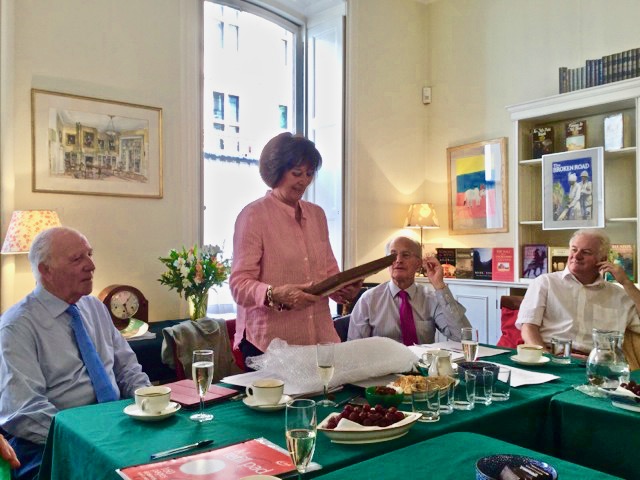When I heard about Harriet Cullen’s resignation, I thought – ‘Yes, she has done a remarkable job as Chairman for a very long time. She deserves to enjoy a rest, and watch the organization she reinvigorated go from strength to strength.’ That was an instinctive response, and now, looking back, I can see it was born from an overwhelming sense that she has achieved something almost superhuman in bringing the KSMA into the twenty-first century.
The KSMA was somewhat constrained in its sphere of operations at the time Harriet took it over. It was in good shape, but in no position to purchase original manuscripts or rare books, as it does today. It did not have a dedicated shop, nor did it publish its own books and postcards. Its governing board, though distinguished and able, was less varied in its composition than today.
By the time Harriet resigned, that had changed. And now, looking back over the last two decades, it is possible to see how carefully and wisely she steered us beyond reach of the privations that previously circumscribed our ambitions. As she bids farewell to the position of Chairman, she leaves the Association in far better shape than when she began.
Her gift was always to nurture a vision of our potential. She took up the idea of holding a yearly poem and essay competition, and ensured it was well organized, doing much of the preparation herself, from her own home. And after the prizegiving, it was her habit to dine those involved, including the prizewinners, in her dining-room. Such commitment is rare, but Harriet never hesitated. And it has proved to be one of the great successes of her term of office, drawing into our ranks such distinguished figures as Bamber Gascoigne, Andrew Motion, Stephen Fry, Tom Paulin, and Claire Tomalin, to name a few.
Nor did she hesitate to establish the bursaries granted to graduate students in the name of Lady Sheila Birkenhead. Thanks to that initiative, the society has enabled many students of the Romantic poets to attend conferences and deliver papers to their peers – and it has earned us the reputation of a generous benefactor.
Over the decades, Harriet sought to draft a wider variety of people into the organization, and at the same time employed a light but firm touch to her conduct of meetings. Board meetings remain among the highlights of my year, partly because they are characterized by virtues instigated by Harriet: tolerance for diversity of opinion; a willingness to engage with differing views; an ability to conduct debate without rancor or ill-humor; and above all a deep, deep respect for the lives and writings of Keats and Shelley, who we memorialize and celebrate.
There are many aspects of Harriet’s custodianship I would like to praise, but if I had to select only one, it would be the priority she has given to cultivation of the Rome House. One could say that her work there began with selection of a new Curator in 1997, Catherine Payling. Over ensuing years, Harriet and Catherine – and, in more recent times, Harriet and Catherine’s successor, Giuseppe Albano – made a formidable team. In the last two decades, the KSMA has celebrated the centenary of the museum (an event that culminated with a Saturnalian event at the residence of the British Ambassador in Rome), introduced air conditioning into its Rome headquarters, and renovated its basement, among other things.
Twenty years is a long time, but as one of Harriet’s colleagues throughout that period, I can say it also feels very short. As I consider the KSMA now, I see how profoundly different it is from the organization Harriet inherited in the 1990s. Perhaps the most obvious of its differences is its fitness to tackle the challenges that lie ahead in this century. She leaves it with a harmonious, smoothly-functioning board which has learnt how to finding solutions and resources when they are needed. She also leaves it in hale and hearty financial shape – something that can be said of few literary organizations these days.
We can only be grateful for Harriet’s tireless work on our behalf, and for her patient, careful and expert handling of the KSMA’s affairs. I very much hope that, despite her withdrawal from the Chairmanship, we will continue to see her at KSMA events and – of course, at the House.
Professor Duncan Wu
KSMA Vice-Chairman and Raymond Wagner Professor in Literary Studies at the University of Georgetown
